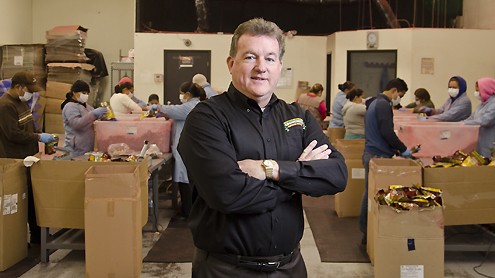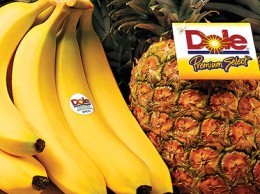Crunchies moves to block takeover bid with Chapter 11 filing
IN THIS ARTICLE
- East Ventura County Topic
- Marlize van Romburgh Author
By Marlize van Romburgh Tuesday, August 26th, 2014

Crunchies Food Co. founder, President and CEO Jim Lacey at the company’s Westlake Village headquarters. (Business Times file photo)
Westlake Village-based Crunchies Food Co. has filed for Chapter 11 bankruptcy protection, alleging that one of its largest vendors has attempted a hostile takeover of the fast-growing freeze-dried snacks maker.
The vendor, a freeze-dried fruit supplier based in the United Kingdom, has responded that it will lobby other creditors to wind down Crunchies through a private liquidation process.
Crunchies last year ranked as the third-fastest-growing firm based in the Tri-Counties, with revenue between 2010 and 2012 jumping 427.3 percent to $11.6 million, according to Business Times records.
The company filed for Chapter 11 bankruptcy — a reorganization, rather than liquidation — on Aug. 15, bankruptcy court records show, after defaulting on payment plans with suppliers. The firm listed more than $10 million in assets and $10 million in debts in its bankruptcy petition.
Crunchies said its products — fruit and vegetable snacks that are freeze-dried using its propriety process — are in about 26,000 stores around the U.S. The firm claims it has a 51 percent share of the freeze-dried snack market and is the fastest-growing brand in both the freeze-dried and dried-fruit snack categories.
In court filings, Crunchies said it was unable to meet the payment schedule required by a settlement with Chaucer Foods Ltd., a freeze-dried strawberry supplier and its largest unsecured creditor, owed about $1 million.
Chaucer “used the settlement discussions to feign interest in making an equity investment” in the company, “only to pounce upon [Crunchies] with an orchestrated hostile takeover in the form of a proposed assignment for the benefit of creditors that would wipe out most unsecured creditors and equity,” Crunchies alleges in its filings.
Crunchies President and CEO Jim Lacey, who founded the business in 2006, could not immediately be reached for comment.
Responding in bankruptcy court filings, Chaucer paints a very different picture. The British firm said that after Crunchies twice failed to pay it $1.5 million owed for freeze-dried fruit, it tried to push through an agreement that will sell Crunchies’ assets and distribute the proceeds to its creditors.
Chaucer alleges that after several repayment plans fell through, Crunchies requested a $1 million loan from Chaucer to continue to fund its operations.
Chaucer said it proposed an assignment for the benefit of creditors, or ABC, essentially a private liquidation process that would sell all of Crunchies’ assets so that the proceeds could be used to repay its creditors. In an ABC, the sale of assets and distribution of proceeds are overseen by a third-party company rather than by a court-appointed trustee.
Chaucer said it is in “active discussions” with the Donald Delaski Revocable Trust and the Chung Family Trust, Crunchies’ largest secured creditors, to get an ABC agreement in place.
In the proposed private liquidation, Crunchies assets would be sold in exchange for the cancellation of its entire $7 million in secured debt and a waiver of Chaucer’s outstanding $1 million unsecured claim, according to Chaucer. In addition, the ABC would result in “the payment of substantial money to the assignment estate, which would have provided a return to general unsecured creditors,” Chaucer said.
“The debtor’s inability to generate positive cash flow has nothing to do with Chaucer,” the British firm said in court filings. “Chaucer was a supplier that the debtor failed to pay, resulting in a lawsuit and a writ of attachment. After reaching a settlement with Chaucer, the debtor defaulted on the parties’ mutually-agreed repayment plan.”
Chaucer could not immediately be reached for comment at either its U.K. headquarters or Michigan office.
Crunchies filed an emergency motion to use cash collateral for secured creditors’ claims to continue to operate the business through its Chapter 11 reorganization. In court filings, its largest creditor and an equity investor, the Delaski trust, said it agreed to the motion. On Aug. 22, Santa Barbara Bankruptcy Court Judge Peter Carroll granted the cash collateral motion on an interim basis, pending a final hearing.
Last year, Crunchies was valued at about $15 million as a going concern for the purposes of raising new capital, according to the Westlake Village firm. That valuation comes from using a multiple of revenue, minus debt. The company said its tangible assets include about $900,000 in accounts receivable and $2.3 million of inventory, valued at cost. The value of its brands, trademarks and other intellectual property is unknown, it said.
If the business is shut down and liquidated, the value would be less than $3.5 million, according to Crunchies.
Crunchies said it is “poised for exponential growth” with deals with Safeway, Walmart, GNC, Kroger, Sprouts, Whole Foods Market and several wholesalers such as Tree of Life, McLane and UNFI. It has about 26 full-time employees and several independent contractors, it said.











